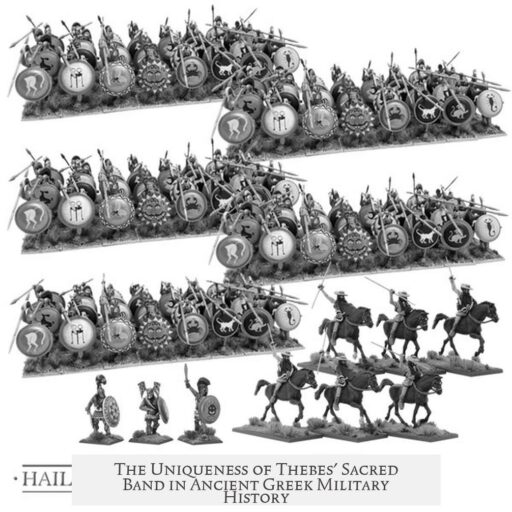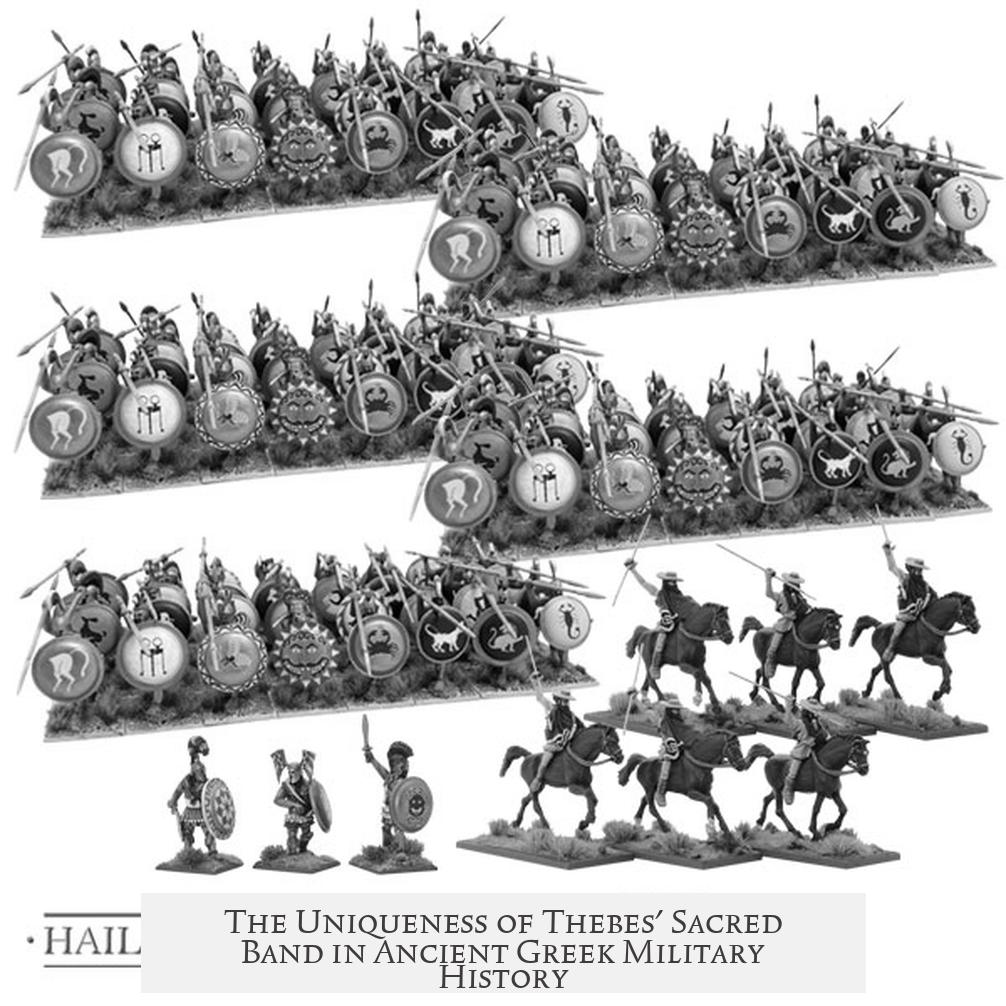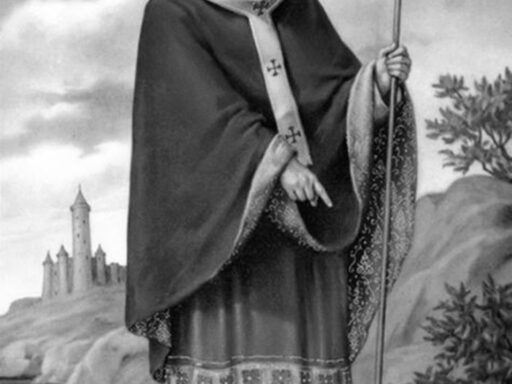The Sacred Band was not a general Greek military unit but a specific elite infantry formation unique to Thebes. While several Greek city-states maintained chosen or elite troops known as epilektoi (“selected ones”), only Thebes designated one such unit with the formal title “Sacred Band” (hieros lochos). This exclusive naming arose largely because the unit’s barracks was located on the Kadmeia, Thebes’ acropolis, a sacred precinct, which inspired its specific title rather than reflecting any pan-Hellenic institutional practice.
Ancient Greek military forces typically included various divisions called lochoi, a generic term for infantry companies ranging in size, often a few hundred men. The name “Sacred Band” thus corresponds to the hieros lochos of Thebes—it means “Sacred Company” or “Sacred Band” but does not suggest a broader use of the term elsewhere.
Historical sources confirm this specificity. Plutarch and later authors apply “Sacred Band” strictly to the Theban unit renowned for its discipline and battlefield prowess, particularly during the 4th century BC. Earlier authors like Xenophon, who documented Theban military actions, refer generically to epilektoi, showing no indication that the unit was widely known or called by a distinctive name at that time.
This lack of a broader tradition is reinforced by the rarity of named elite infantry units in Greek historiography. Unlike Roman legions, Greek city-states seldom developed permanent, uniquely named military units. Most specialized troops are known only by generic descriptors or ad hoc names related to their recruitment or functions.
In contrast to Thebes, other city-states such as Athens, Phleious, Elis, and Argos also organized epilektoi—selected troops used in battle. However, none formally employed the term “Sacred Band” or a similar sacred designation. Instead, “epilektoi” served as a practical label for these elite forces.
“There was no common practice of naming elite units ‘Sacred Band.’ There were no other Sacred Bands in the Greek world.”
The use of “Sacred Band” for elite troops seems almost entirely singular to Thebes, deriving from the band’s permanent station inside the sacred precinct of Kadmeia, symbolically linking their military role with local religious sanctity. They were thus not only chosen for their fighting ability but were also symbolically “set apart” as defenders of the city’s core.
Interestingly, late Greek sources also apply the term “Sacred Band” to a Carthaginian elite infantry potentially resembling the Theban model. However, this usage is likely a Greek literary or interpretative imposition. The Carthaginian elite force does not originate the name, and they may or may not have had a comparable unit. Greek historians mentioning a Carthaginian Sacred Band wrote centuries later, offering no clear evidence for its existence or significance. Some scholars view this as a mislabeling or projection of the familiar Theban term onto an unfamiliar foreign formation.
This contrast strengthens the view that the Sacred Band was a uniquely Theban creation rather than a pan-Greek institutional type.
| Aspect | Theban Sacred Band | Other Greek City-States |
|---|---|---|
| Name Usage | Officially called “Sacred Band” (hieros lochos) | Elite troops called epilektoi (“selected ones”), no “Sacred Band” |
| Origin of Name | Barracks located in sacred precinct of Kadmeia in Thebes | No sacred designation; names were generic or related to function |
| Existence Duration | Established as a standing, permanent, highly trained infantry unit | Epilektoi were often ad hoc or campaign-specific |
| Historical Sources | Named by Plutarch and other late authors; earlier authors use generic terms | Known generically without distinct formal titles |
The Sacred Band of Thebes is therefore best understood as a unique elite infantry unit created within the Theban military system. The formal title “Sacred Band” emerges from local context rather than reflecting a widespread Greek practice.
- The term lochos means a generic infantry unit; “Sacred Band” refers only to the Theban unit housed in a sacred precinct.
- Greek city-states generally referred to their chosen troops as epilektoi, not as Sacred Bands.
- Historical accounts of other “Sacred Bands,” such as the Carthaginian one, are scarce and likely reflect Greek interpretative naming.
- Therefore, the Sacred Band is a Theban military institution unique in name and status.
Were Sacred Bands a general Greek unit or was it specific to Thebes?
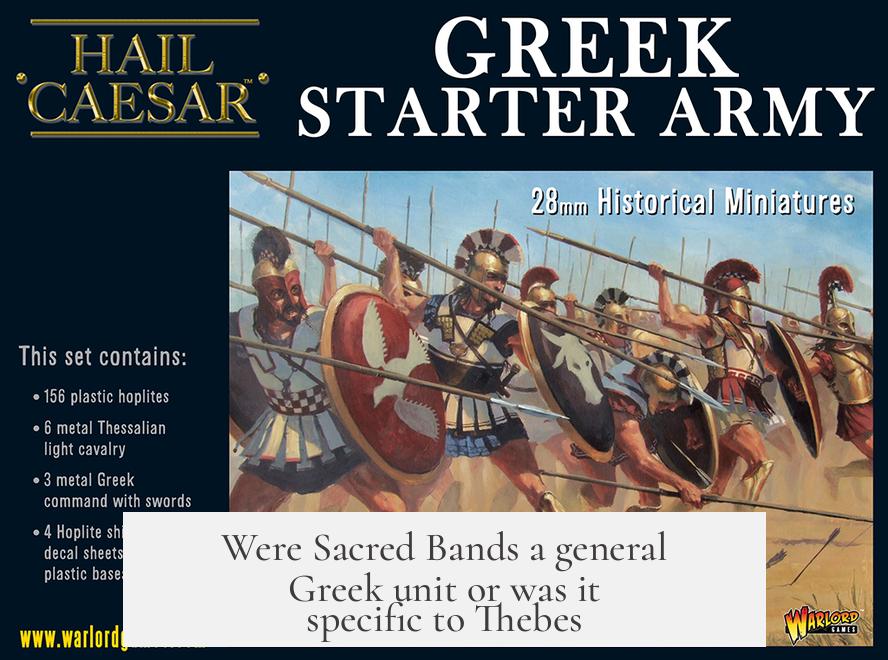
The Sacred Band, as an elite military force, was specific to Thebes and not a general Greek unit. The name “Sacred Band” (hieros lochos) referred uniquely to this Theban formation, distinguished by its permanent barracks on the sacred Kadmeia hill, although other Greek city-states maintained elite troops commonly called epilektoi, or “selected ones.”
Let’s unpack this to understand what made the Theban Sacred Band stand tall, literally and figuratively, in the annals of ancient military history. Spoiler alert: not every Greek city had one, and the name Sacred Band wasn’t a catch-all label for elite troops across Greece.
The Mystery of Ancient Elite Troops and Their Names
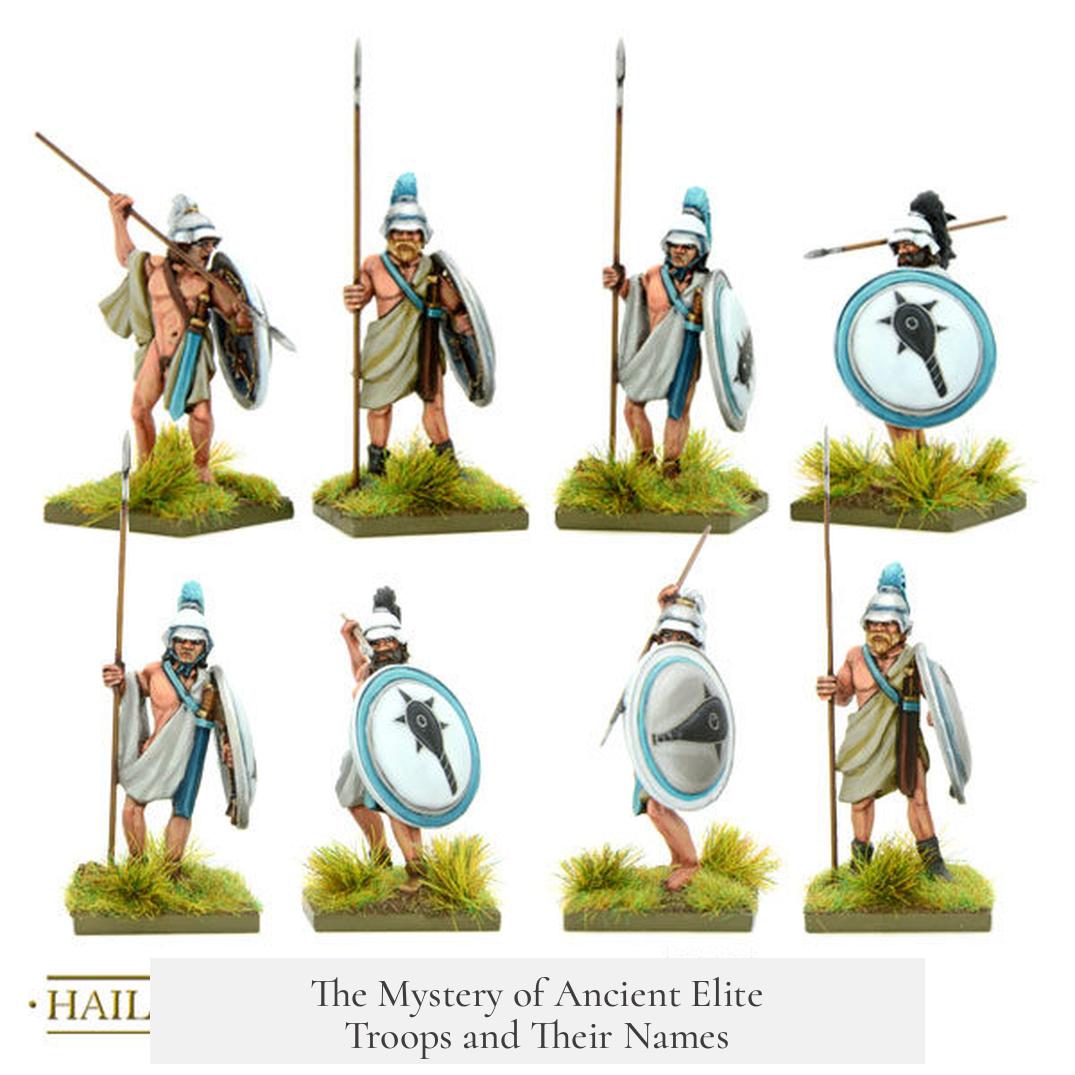
The fascination we modern-day army buffs have with named elite units didn’t quite exist for the ancient Greeks. Unlike the Roman legions, where specific units had strong, enduring identities, Greek sources almost never bother to name their smaller elite units. Xenophon, one of our prime sources on Greek warfare, often calls such groups simply “the picked troops” rather than giving them snazzy titles.
These units tended to form and dissolve fairly quickly, so they didn’t develop the deep institutional traditions or histories that would cement a memorable name. It’s like they were the special forces of their day, but without the marketing.
The Theban Sacred Band: A Unique Name Rooted in Place

The Sacred Band we hear about is a Theban phenomenon. Plutarch and other late authors are behind the actual naming of this unit as the “Sacred Band” — or, more grammatically, hieros lochos. Why? Because their barracks were on the Kadmeia, Thebes’ acropolis, traditionally a sacred spot filled with sanctuaries. So, calling them “Sacred Band” was tied to geography, not a broader Greek tradition of naming elite troops this way.
Interestingly, Plutarch also refers to them as the “City Band” (poleôs lochos), emphasizing their role as a standing, permanent unit stationed in the heart of Thebes. Other writers, like Xenophon — who actually lived closer in time to the events — don’t mention any special name for these troops at all and simply call them epilektoi, meaning “the selected ones.”
Think of it this way: Theban citizens didn’t just pull some dregs of the population to fight elite battles. They picked the best warriors, stationed them permanently, and housed them on hallowed ground, which led later historians to give them this “sacred” tag.
Generic Terms and Greek Military Units
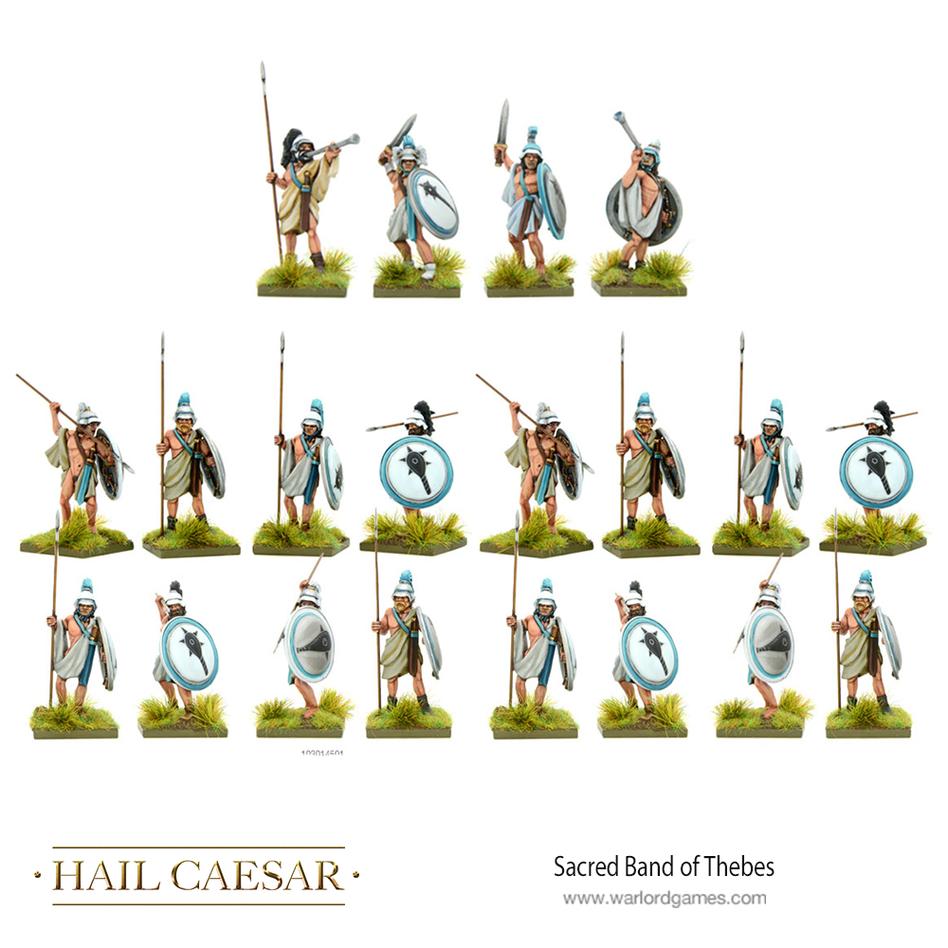
The word lochos, often translated as “band,” is annoyingly generic. It just means a segment of infantry—a few hundred men usually. Spartan, Athenian, and Argive armies all split their forces into lochoi. So, “Sacred Band” is not so much a fancy title as an identifier for one particular lochos in Thebes that was “sacred” or “of the city.”
Many Greek city-states used the term epilektoi for their own picked troops, whether in Elis, Athens, or Phleious. These units were the real Greek general feature—special troops, but without special names. So, while elite units as a concept were generally Greek, the “Sacred Band” title was not.
Sacred Bands Beyond Thebes? Let’s Talk Carthage
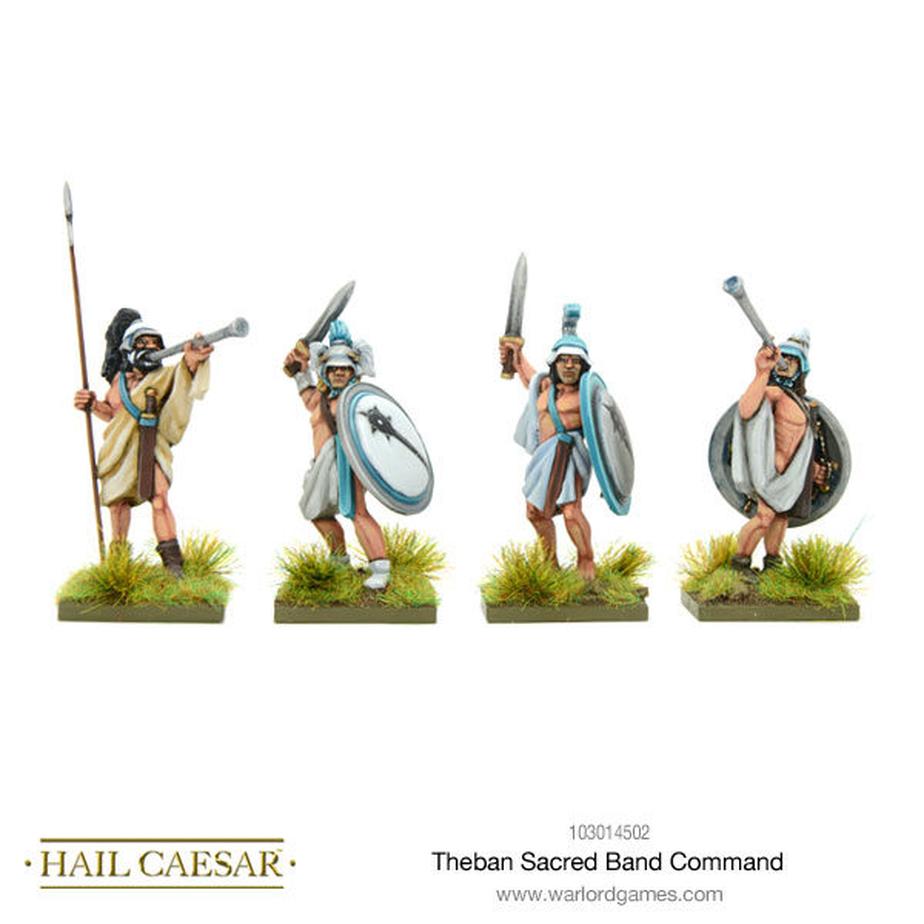
Now, here’s a twist for the curious: some ancient sources mention a Carthaginian “Sacred Band” during battles in the late 4th century BC. But, and it’s a big but, this name wasn’t Carthaginian; Greek historians applied the phrase retroactively.
Details are sketchy and contradictory. Some texts say this Carthaginian Sacred Band was 2,500 men, others say 3,000. What’s clear is they were well-equipped citizens fighting as heavy infantry, much like any elite force. Why the “sacred” name? No one really knows.
One theory is that Greek historians, knowing about the Theban Sacred Band, just slapped a familiar label on an elite Carthaginian group. Alternatively, this Carthaginian force might have been a temporary elite unit raised for specific campaigns, misread by authors who assumed such units were permanent like Thebes’.
Some scholars even wonder if the Carthaginian Sacred Band never existed as a formal entity. It might be a Greek case of mistaken identity or wishful naming, rather than a documented military institution. So, even with this outlier, the Theban Sacred Band remains the exemplar.
So, Why Does This Matter Today?
The distinctiveness of the Theban Sacred Band tells us a lot about Greek military culture and identity. Thebes clearly valued their elite soldiers enough to maintain a standing, highly trained force and invest in their symbolic location on the Kadmeia. Other Greek city-states preferred loose notions of “selected” troops without binding them to permanent, named units.
The Theban model also reflects how ancient city-states balanced military power with religious and civic identity. Housing an elite unit in a sacred precinct underpinned their social significance.
This specificity means that when historians talk about “Sacred Bands,” they should be careful not to generalize. Greek warfare was diverse; only Thebes had the famous “Sacred Band.” Others relied on less formal elite groupings without grand titles.
Practical Takeaways for History Buffs and Students
- If you’re reading classical sources, watch how authors refer to elite troops: epilektoi rather than “Sacred Band” is more accurate for generic picked forces.
- Understand that “Sacred Band” is a label given centuries after the fact, tied closely to Theban lore and geography.
- Don’t get too excited about “Sacred Bands” popping up elsewhere—like Carthage—without scrutinizing the source context and motivation for naming.
- Remember, while many Greek states fielded elite troops, only Thebes is famed for a standing elite named the Sacred Band.
Final Thoughts
The Sacred Band of Thebes is a fascinating case of an elite military unit whose name and identity are wrapped in a sacred place and civic pride. It stands apart from the general Greek practice of elite troop deployment and naming conventions.
Why should you care? Because it overturns simplistic assumptions about Greek armies and reveals the complexity—and occasional quirks—of ancient military history. The Sacred Band wasn’t a generic Greek thing, but a unique Theban treasure—remember that next time you casually drop the phrase “Sacred Band” in conversation!
Looking for more? The Reddit post by u/Iphikrates dives deep into the Theban Sacred Band but stops short of addressing this exact naming question. It’s a great start for anyone hungry for military history nuggets.
So, let’s give credit where it’s due: the Sacred Band is Thebes’ proud, sacred, elite—and uniquely named—warrior set. No one else quite got the same honorific treatment!
Were Sacred Bands a common type of unit in ancient Greek armies?
No, the Sacred Band was not a common type of unit across Greek armies. Most Greek cities used the term “epilektoi” for elite troops. The Sacred Band name was unique to Thebes and linked to their specific military unit.
Why was the Theban elite unit called the Sacred Band?
It was named for its barracks’ location on the Kadmeia, a sacred area in Thebes. The name “Sacred Band” (hieros lochos) reflects its base rather than a general military term used widely.
Did any other Greek cities have units called Sacred Bands?
No other Greek city known to us had elite units officially called Sacred Bands. References to selected troops elsewhere used generic terms like epilektoi, not sacred bands.
Was there a Sacred Band outside Greece, like in Carthage?
Some later sources mention a Carthaginian “Sacred Band.” This likely comes from Greek writers applying the term to an elite citizen infantry, not an actual Carthaginian name or permanent unit.
What does the term “lochos” mean in the context of Sacred Band?
“Lochos” simply means a military company or band of soldiers. It is a generic term used in many Greek armies. The name Sacred Band means this specific lochos was considered special by Thebans.
